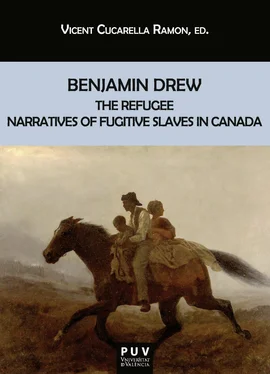THE work here offered to the public will be found, we venture to say, one of the most instructive and interesting that has yet appeared on the subject of American Slavery. It is original in design and scope, and has been executed with the most conscientious care and fidelity. The author is a gentleman of high character, whose statements may be implicitly relied upon, and whose intelligence is not likely to have been deceived. As for the statements of the Fugitives from Slavery, they speak for themselves. Nowhere else can be found such a mass of direct and unimpeachable testimony as to the true character of the Peculiar Institution, by witnesses who have had the best opportunities of knowing its nature, and who occupy a point of view from which its characteristic lineaments can be most distinctly discerned.
We are confident that “A North-side View of Slavery” will prove to be not only one of the most effective Anti-slavery arguments ever issued from the press, but a valuable and permanent contribution to American Literature.
JOHN P. JEWETT & CO.
AUTHOR’S PREFACE
THE colored population of Upper Canada, was estimated in the First Report of the Anti-Slavery Society of Canada, in 1852, at thirty thousand. Of this large number, nearly all the adults, and many of the children, have been fugitive slaves from the United States; it is, therefore, natural that the citizens of this Republic should feel an interest in their fate and fortunes. Many causes, however, have hitherto prevented the public generally from knowing their exact condition and circumstances. Their enemies, the supporters of slavery, have represented them as “indolent, vicious, and debased; suffering and starving, because they have no kind masters to do the thinking for them, and to urge them to the necessary labor, which their own laziness and want of forecast, lead them to avoid.” Some of their friends, anxious to obtain aid for the comparatively few in number, (perhaps three thousand in all,) who have actually stood in need of assistance, have not, in all cases, been sufficiently discriminating in their statements: old settlers and new, the rich and the poor, the good and the bad, have suffered alike from imputations of poverty and starvation– misfortunes, which, if resulting from idleness, are akin to crimes. Still another set of men, selfish in purpose, have, while pretending to act for the fugitives, found a way to the purses of the sympathetic, and appropriated to their own use, funds intended for supposititious sufferers.
Such being the state of the case, it may relieve some minds from doubt and perplexity, to hear from the refugees themselves, their own opinions of their condition and their wants. These will be found among the narratives which occupy the greater part of the present volume.
Further, the personal experiences of the colored Canadians, while held in bondage in their native land, shed a peculiar lustre on the Institution of the South. They reveal the hideousness of the sin, which, while calling on the North to fall down and worship it, almost equals the tempter himself in the felicity of scriptural quotations.
The narratives were gathered promiscuously from persons whom the author met with in the course of a tour through the cities and settlements of Canada West. While his informants talked, the author wrote: nor are there in the whole volume a dozen verbal alterations which were not made at the moment of writing, while in haste to make the pen become a tongue for the dumb.
Many who furnished interesting anecdotes and personal histories may, perhaps, feel some disappointment because their contributions are omitted in the present work. But to publish the whole, would far transcend the limits of a single volume. The manuscripts, however, are in safe-keeping, and will, in all probability, be given to the world on some future occasion.
For the real names which appear in the manuscripts of the narratives published, it has been deemed advisable, with few exceptions, that letters should be substituted.
To those persons mentioned in the course of the work as having given him assistance and aid, the author acknowledges his obligations: and he feels, likewise, that his thanks are due to Thomas Henning, Esq., Secretary of the Anti-Slavery Society of Canada; F. G. Simpson, Esq., Agent of the same Society, and S. Walton, Esq., of Toronto; John Doyle, Esq. City Clerk, London; Rev. Mr. Peyden, of Hamilton; Rev. William King, Buxton; John Hatfield, Esq., Amherstburg; John Fairfield, Esq., Canada West.
BOSTON, 1855.
INTRODUCTION
WHEN in any State, the oppression of the laboring portion of the community amounts to an entire deprivation of their civil and personal rights; when it assumes to control their wills, to assign them tasks, to reap the rewards of their labor, and to punish with bodily tortures the least infraction of its mandates, it is obvious that the class so overwhelmed with injustice, are necessarily, unless prevented by ignorance from knowing their rights and their wrongs, the enemies of the government. To them, insurrection and rebellion are primary, original duties. If successfully thwarted in the performance of these, emigration suggests itself as the next means of escaping the evils under which they groan. From the exercise of this right, they can only be restrained by fear and force. These, however, will sometimes be found inadequate to hold in check the natural desire of liberty. Many, in spite of all opposition, in the face of torture and death, will seek an asylum in foreign lands, and reveal to the ears of pitying indignation, the secrets of the prisonhouse.
The escape of slaves forms the most irritating subject of discussion between the North and the South.
If on this, as on all other evils connected with or growing out of slavery, a common man of plain common sense, were asked his opinion, he would probably say–“remove the cause and the effects will cease; remove the oppression which induces to emigration, and a fugitive slave will be an impossibility.” But this “would only excite a smile at the South.” How mistaken is common sense!
The South are taking measures, (when was it otherwise?) to preserve, extend, and perpetuate slavery. The problem must be solved, if solved at all, without the oppression being removed.
By the combined influence of ignorance and fear, the amount of emigration has been reduced to a minimum. We could wish the South would adopt a mode of reasoning sometimes presented to us,–something of this sort;–in all kinds of business, losses are inevitable. Men at the North lose by fall of stocks, by consignments, by fires, and in a great variety of ways. If a Yankee loses a ship worth twenty thousand dollars, he does not expend one hundred thousand in endeavoring to fish it up. He simply enters it in his account of profit and loss. And if a slave runs away, we might as well make the same entry quietly, as to wound the feelings and sensibilities of our northern friends; magnifying and increasing “the deep sectional difference of inborn feeling;” and filling whole cities with grief, shame, and an indignation irrepressible, except by marines and detachments of artillery.
Meanwhile the fugitive slave law continues to be enforced.
Gloss the matter over as much as we may, and take “south-side views” through a multiplying glass,–yet we must admit, that the slave’s is a cruel lot.
We may compare King James’s or the Douay Bible with the Hebrew and the Septuagint; we may find there, and in all recensions, polyglotts, and translations extant, the history of Abraham and Hagar,–yet we must allow, that an American slave, in his best estate, is a man badly educated, and systematically ill used.
We may study the New Testament and become conversant with the proceedings of Paul in regard to Onesimus; we may wade through the commentaries of pro-slavery and anti-slavery writers thereupon,–yet the truth will remain, that an American slave is deemed “a chattel personal,”–the property of a master to whom he belongs,”–that he is liable to be flogged, sold, and divorced, as the interest, caprice, or spite of his master may dictate.
Читать дальше











![Benjamin Franklin - Memoirs of Benjamin Franklin; Written by Himself. [Vol. 2 of 2]](/books/747975/benjamin-franklin-memoirs-of-benjamin-franklin-wr-thumb.webp)
![Benjamin Franklin - Memoirs of Benjamin Franklin; Written by Himself. [Vol. 1 of 2]](/books/748053/benjamin-franklin-memoirs-of-benjamin-franklin-wr-thumb.webp)